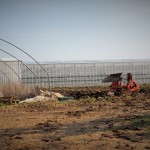Summarize : The appeal trial of a farmer who employed Senegalese irregularly, making them work up to 13 hours a day without ever paying for them, testifies to the existence of situations close form modern slavery in our land. Yet … Continue reading
Tag Archives: Labour law
Seasonal Migrants in agriculture: a “shot in the arm” for employers, rights stifled for workers.
Gallery

This gallery contains 2 photos.
Summary : In the Lot-et-Garonne department, the use of foreign seasonal workers – mainly Polish people – to meet the agricultural needs is widespread. For employers, they are a labor hardworking and flexible, unlike local job seekers. A priori, interests … Continue reading
1 August 2014: with a month delay implementation of the minimum wage in the German meat industry
Following the agreement signed in January 2014, a minimum wage in the German meat industry has finally come into force. This should be valid for all workers of the German territory slaughterhouses, whether directly employed by the company or employed through subcontractors. Many doubt its actual application and warn against existing practices in order to push or circumvent its application. The full article is available HERE in German on the website of our partner ALSO.
.
Attempts to improve agricultural seasonal labor conditions in Germany: the label “Faire Saisonarbeit”
Gallery
At the beginning of each crop season, the German media publish one or two reports on poor working conditions of seasonal workers in Germany. Given the negative impact these reports could have on all producers in the sector, IGBAU [1] … Continue reading
Between the prefabricated housing and asparagus fields ..
Summary:
Asparagus is a luxury vegetable very consumed in Germany, since 2003 she is the first producer in Europe. But the lack of a minimum wage applied to all professional sectors and the system of Minijob (short-term contracts, very few binding on the employer) causes many abuses of agricultural workers. The agricultural labor force employed in the collection of vegetables and fruits is almost essentially foreign. Polish Historically, there has been an influx of Romanians and Bulgarian recent years. Working conditions, hard because pickups techniques are often made worse by rights violations and lack of control tools.
The imposition of a minimum wage would be a first step towards more equality between national and foreign workers, but many blockages exist among employers. They fear not being able to withstand competition and pressure on prices, this is particularly true for those who sell their production outside of short circuits.
Demonstration in Cloppenburg against modern slavery
Gallery

This gallery contains 1 photo.
On 26 April 2014, about 200 people gathered in Cloppenburg to protest against the abuses of outsourcing contracts and to denounce the unacceptable working conditions and life, imposed detached and seasonal workers. Organized by Mida (network for human dignity at … Continue reading
“The whole system is a fraud to the entire society” – Interview with Matthias Brümmer
In 2012, about 58 million pigs, 3.6 million cattle and 1 million sheep were slaughtered in Germany. The German meat industry is so effective that the country has become the slaughter of Europe, but also on the way to becoming the world’s largest meat exporter. With the start of the barbecue season, Lidl offers 20% per kilo of pork loin or € 3.99 per kilo. This award is achieved through the exploitation of workers, mostly East European countries. This with the help of the directive on the posting of workers to principles rather vague, leaving room for all kinds of abuse from shady supplier. Matthias Brümmer, head of the local branch of Oldenburg union for food and catering (NGG) explains how the business of cheap meat.
A brief about the legal framework of migrant labor in The Netherlands
Gallery
Aim of this little article is to give few insights on basis of the legal framework of labor in The Netherlands, in which seasonal migrant work in agriculture is also attached. A return on legal framework of labor in … Continue reading
“If you’re not happy, go away!”
Germany, the leading European food industry is increasingly criticized for the social and environmental price for its economic success. Only two weeks after my arrival in Lower Saxony, I have already seen the devastating effects of its operation. For years, thousands of posted workers suffer abuses of unscrupulous subcontractors. Through these “service contracts” large groups such as Tönnies, Danish Crown, Heidemark, Vion “rent” contract workers. These service contracts can circumvent the German labor law and to drastically cut wages. Beyond the damage suffered by the employees, this creates a problem of unfair competition. Most of these contract workers are from Eastern Europe (Romania, Poland, Bulgaria) and are subject to daily pressures. They are willing to accept conditions of living and working close to slavery, for fear of losing their jobs and having to return home without money.
Summary:
The testimonies of some former slaughterhouse workers report numerous violations of the rights of unsustainable rates, threats … Given the particular problem in the Lower Saxony region a consultancy mobile cell and access to rights was mounted in the program Faire Mobilität. More and more exploited workers use them. One of the counselors testify situations observed and the mafia look of subcontracting companies. For her the imposition of a minimum wage does present a partial solution if the checks were conducted on the workplace but also in life. According to her the exploitation of migrant workers in Lower Saxony receives little interest from public opinion, more concerned about the breeding conditions and slaughter of animals.
ECVC: Working group on migrant agricultural workers
Gallery

This gallery contains 1 photo.
27.02.2014 Press Release of ECVC (European coordination Via Campesina) Working group on migrant agricultural workers In recent years, the working group related to the issue of migrant agricultural workers in ECVC has gone through important moments of political and human … Continue reading
Employment of third country seasonal workers : a useless directive! by AEDH

AEDH can only regret the adoption by the European Parliament, on 5th February, of the directive “on the conditions of entry and residence of third-country nationals for the purposes of seasonal employment”.
Among the four texts of the “labour migration” package of the Hague Programme, the seasonal workers directive is the least protective of workers’ rights, and despite some limited guarantees, AEDH considers that it will not put an end to the exploitation of the persons concerned. One may even fear that the very strict control over the access to seasonal employment and their unsuitability for this specific activity will in fact lead to an increase in clandestine work.
The Hague Programme indeed endeavoured to divide rights of migrant workers proportionally to their qualifications, considering them as simple adjustment variable of the EU “economic needs”, far from the spirit of Tampere and from an inclusive vision of immigration. In this context, seasonal workers are treated as a sub-category of the useful workforce and have been excluded from the scope of the EU Single Permit directive which was supposed to ensure common rules and rights to all third-country nationals who are employed and who do not have the long-term resident status.
The adopted directive remains unclear on numerous aspects and is very restrictive in terms of residence and contract.
The definition of seasonal worker is the following: “third-country national who retains his/her principal place of residence in a third country and stays legally and temporarily for the purposes of employment in the territory of a Member State to carry out an activity dependent on the passing of the seasons, under one or more fixed-term work contracts concluded directly between the third-country national and the employer established in that Member State”.
Seasonal workers must therefore, prior to any stay, have a contract with an employer; in most cases, the role of intermediaries will thus be crucial for the establishment of this contract. The intermediaries will have even more power, while they are already the source of traffic of workforce. This role of power can only increase, in absence of any risk of sanctions, contrary to employers. For many seasonal workers, the alternative will be to come irregularly, or, after a first legal seasonal work, not to return to their country of origin in violation of the obligations of the directive. In both cases, if they are discovered, these workers are running the risk of being expelled and of not being allowed again to obtain a residence permit and a legal employment in EU countries and will therefore be condemned to clandestinity and insecurity.
Insecurity also characterises legal residence since States are not required to compel employers to pay travel expenses and health insurance, nor to provide family and unemployment benefits.
AEDH would like to highlight that the directive adopted by the Parliament does not guarantee:
- Equal treatment between workers in their workplace;
- Standards equal to those applied to EU seasonal workers
- Protection of economic and social rights in compliance with European standards and, ad minima, with standards of the “Convention on the Protection of the Rights of All Migrant Workers and Members of their Families” as well as of the International Labour Organization (ILO);
- Access to long-term resident status or a comparable right, after consecutive years of seasonal work.
More generally, it is the legal architecture itself, created by the “Policy Plan on Legal Migration”, the directive on seasonal employment only is a part of, which leads to a discriminatory treatment between different categories of migrant workers and to limited protection and rights for seasonal workers from third countries.
Therefore, there is a high risk that this directive will only lead to more precariousness, clandestinity, and exploitation of migrant workers concerned, which is far from the good intentions proclaimed. That is why AEDH is asking for an all-embracing status of labour migration, based on equal rights regardless of nationality; this would be the best guarantee given to seasonal workers.
AEDH is calling on the EU institutions to break with a utilitarian logic of labour migration, to consider migrant workers as what they really are: human beings; this in line with article 20 of the Charter of Fundamental Rights which stipulates that “everyone is equal before the law” and pursuant to the guidelines set by the Commission under the Stockholm Programme, that “the EU must strive for a uniform level of rights and obligations for legal immigrants comparable with that of European citizens”.
Download the full press release in English (unofficial translation) and in French.
Press contact:
Pierre Barge, Honorary Chairman
Catherine Teule, Vice-chairwoman
AEDH, Association Européenne pour la défense des Droits de l’Homme
33, rue de la Caserne. B-1000 Bruxelles Tél : +32(0)25112100; Fax : +32(0)25113200;
Email:
The European Association for the Defence of Human Rights (Association Européenne pour la défense des Droits de l’Homme – AEDH) consists of associations and leagues defending human rights in the countries of the European Union. AEDH is an associate member of the International Federation of Human Rights (Fédération internationale pour la défense des droits de l’Homme – FIDH).
Thai traffic in the service of Israeli colonization
Gallery

This gallery contains 3 photos.
The violence and massive strikes of Palestinian workers that took place during the two Intifadas1 paralyzed the Israeli economy, heavily dependent on Palestinian labor, following the closure of the borders between Israel and the West Bank by the occupying army.. … Continue reading
▶ Agriculture in Europa – Video Retales & Amisnet
Mobilisations of farm workers, from yesterday to today
Gallery
The Italian social movement of the 20th century is characterized by duality. While northern Italy, urban and industrialized, was shaken by the challenge of labor organizations, southern, rural Italy, lived to the rhythm of the mobilizations of agricultural workers. Since … Continue reading

